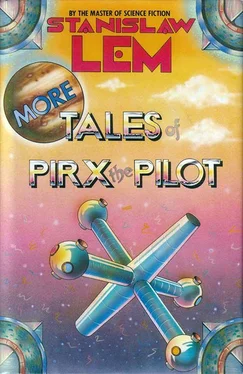“Why did Klyne hold back, in your opinion, Commander?” asked Hoyster.
Pirx felt his insides go cold; before answering, he cast a glance around the table. It was a question that had to be asked, though he didn’t relish being the first to face it.
“I don’t know the answer to that.”
“Of course not. But you’re an old-timer; put yourself in his place…”
“I did. I would have done what I tried to make him do.”
“And?”
“No response. A madhouse. Yelling, maybe. The tapes will have to be checked and rechecked, though I’m afraid it won’t do much good.”
“Commander,” said Hoyster, in a soft but painstaking voice, as if struggling to choose his words, “you realize the situation, don’t you? As we’re speaking, there are two more superfreighters, equipped with the exact same guidance system, on the Aresterra line. The Anabis isn’t due for another three weeks, but the Ares is nine days away. No matter what our obligations to the dead, we owe more to the living. I’m sure in the past five hours you’ve given some thought to the case. I can’t force you, but I’m asking you to speak your mind.”
Pirx blanched. He’d read Hoyster’s mind from his opening words, and a sensation, opaque, born of his nightmare, gripped him: an intense, desperate silence, a faceless enemy, and a double killing—of himself and the other. It came and went. He collected himself and looked Hoyster in the eye.
“I see,” he said. “Klyne and I belong to two different generations. When I was getting my wings, servo-mechanisms were more error-prone. Distrust becomes second nature. My guess is … he trusted in them to the end.”
“He thought the computer was in control, had a better command of the situation?”
“Not so much in control. More like, if the computer couldn’t handle it, a man would be even less likely to do so.”
He sighed. He’d spoken his mind without casting a shadow on his younger, now deceased, colleague.
“Was there any chance of saving that ship, Commander?”
“Hard to say. There was so little time. The Ariel dropped to zero velocity.”
“Have you ever soft-landed under such conditions?”
“Yes. But in a ship with a smaller mass, and it was on the Moon. The longer and heavier the ship, the harder it is to regain stability when you’re losing speed, especially if it goes into a list.”
“Did Klyne hear you?”
“I don’t know. He should have.”
“Did he ever override the controls?”
Pirx was about to defer to the tapes, but answered instead:
“No.”
“How do you know?” It was Romani.
“The monitor showed ‘automatic landing’ the whole time. It went off only on impact.”
“Could it not be, sir, that Klyne didn’t have time?” asked Seyn. Why was he “sirring” him when they were buddies? Hm. Keeping his distance, maybe. Out to get him?
“The chances of survival can be mathematically deduced.” Pirx was aiming for objectivity. “I just don’t know offhand.”
“But once the list exceeded forty-five degrees, stability was irretrievably lost,” insisted Seyn. “Right?”
“Not on the Cuivier it wouldn’t be. One can increase the thrust beyond the accepted limits.”
“An acceleration over twenty g’s can be fatal.”
“It can be. But a fall from five kilometers up has to be.”
That ended their brief exchange. Tobacco smoke hung under the lights, which had been switched on despite the daylight.
“Do you mean that Klyne could have manned the controls but didn’t?” This was the chairman, Hoyster, picking up the thread.
“It looks that way.”
“Do you think you might have rattled him when you butted in?” asked Seyn’s assistant, a man from Agathodaemon, a stranger to Pirx. Was the home team against him? He could understand it if they were.
“It’s a possibility. There was a lot of shouting in the cockpit. Or at least that’s what it sounded like.”
“Panic?” asked Hoyster.
“No comment.”
“Why?”
“You can listen to the tape. The voices were too garbled to be hard data. Too easy to misinterpret.”
“In your opinion, could ground control have lent further assistance?” asked a poker-faced Hoyster. The committee was obviously divided; Hoyster was from Syrtis Major.
“No. None.”
“Your own reaction would seem to contradict you.”
“Not really. Control has no right to countermand a skipper in such a situation. Things can look a lot different in the cockpit.”
“So you admit you acted contrary to the rules?” Seyn’s assistant again.
“Yes.”
“Why?” asked Hoyster.
“The rules aren’t sacred. I always do what I think right. I’ve had to answer for it in the past.”
“To whom?”
“The Cosmic Tribunal.”
“But you were cleared of all charges,” intruded Boulder. Syrtis Major versus Agathodaemon: it was blatantly obvious.
Pirx paused.
“Thank you, sir.”
He sat down in an adjacent chair. Seyn was the next to testify, followed by his assistant. They were still at it when the first ground recordings arrived. Telephone reports from the wreckage site confirmed the absence of any survivors, though they had yet to reach the Ariel’s cockpit, buried eleven meters below ground. The committee proceeded to audit the tapes and continued taking depositions without a break until seven, then recessed for an hour. Seyn and the Syrtisians drove out to the site of the shipwreck. Romani stopped Pirx in the passageway.
“Commander Pirx…”
“Yes?”
“You haven’t any—uh—”
“Don’t. The stakes are too high,” interrupted Pirx.
Romani nodded. “You have seventy-two hours’ furlough. We’ve worked it out with Base.”
“Earthside?” asked Pirx, astonished. “I don’t see how I can be—”
“Hoyster, Rahaman, and Boulder want to co-opt you onto the committee. You’re not going to let us down, are you?”
All three were Syrtisians.
“I couldn’t even if I wanted to,” he replied, and they let it go at that.
They reconvened at nine. The replay of the tapes was dramatic, but not nearly as much as the film, which recorded each stage of the calamity, from the moment the Ariel loomed as a green star in the zenith. Afterward, Hoyster gave a recap of the post-mortem.
“All the evidence points to a computer breakdown. If it didn’t signal a meteorite alarm, it must have projected the Ariel on a collision course with something. The tapes show that it was three percent over the limit. Why, we don’t know. Maybe the cockpit will provide a clue.” He was referring to the Ariel’s on-board tapes, though Pirx did not share his optimism. “We’ll never know the exact sequence of events during those final moments in the cockpit. We do know that the computer’s Baud rate was perfect: even at the peak of the crisis, it was fully operative. The sub-routines performed flawlessly till the end, too. That much has been established. We’ve uncovered nothing to indicate any external or internal interference with the prescribed landing procedure. From 0703 to 0708 hours, all systems were go. The computer’s decision to abort the landing cannot, at present, be explained. Mr. Boulder?”
“I don’t get it,”
“A programming error?” asked someone.
“Impossible. The Ariel had made landing after landing with the very same program—axially, and at every possible angle.”
“But that was on the Moon, under conditions of lesser gravity.”
“Of possible consequence for the thrust modulators, but not for the informational systems. Besides, the power didn’t quit.”
Читать дальше












